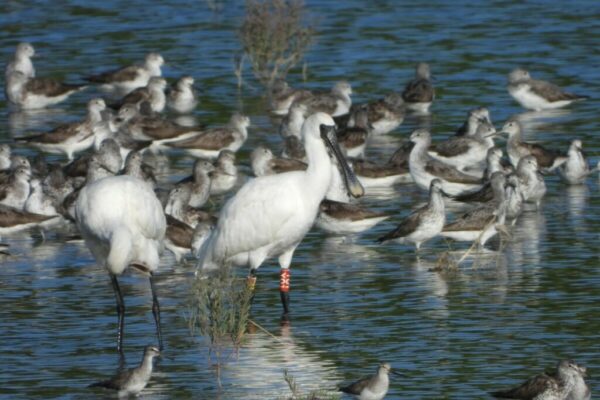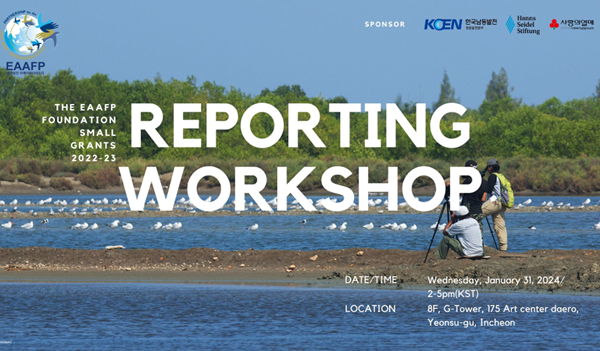In the words of Yong June Kim,
“Since I had a chance to meet the EAAFP Secretariat previously when I was working as a researcher intern at one of the EAAFP Secretariat’s Partners, Hanns Seidel Foundation Korea in 2021, I slowly grew my interest in the Secretariat’s work as a Partnership that brings diverse layers of local stakeholders to facilitate conservation of migratory waterbirds and their habitats. As I am an undergraduate who studies Conflict Analysis & Resolution field, I believed it would be a great opportunity to understand the dynamics between stakeholders with different interests and the Partnership’s peacebuilding role to promote sustainable development for all. In this regard, I decided support the EAAFP Secretariat’s contributive works as a Programme Assistant.
A Programme Assistant supports the overall international and local projects implemented for the conservation of migratory waterbirds along the EAAFlyway. Based on such activities, the Programme Assistant continuously supports the management of the Flyway Site Network of the EAAFP and facilitates the ongoing conservation activities led by the stakeholders both locally and globally. The Detailed duties follow:
- Assist Site Information Analysis and Management Support:
The Programme Assistant fully assists with the process of site information and management support through the designation of Flyway Network Site (FNS) of the EAAFP. Once the scientific review is done for the site which is identified as a globally important site for its local biodiversity and migratory waterbird species, the FNS designation process is made; the Programme Assistant coordinates the overall process by sending the letters to the Focal Points as well as updating the FNS status and relevant information on the country and resource pages of the EAAFP Secretariat.
- Communication, Documentation and Coordination Support
The Programme Assistant has numerous opportunities to visit the site and participate in meetings with local key stakeholders, which means that assisting with communication between EAAF Partners, governmental focal points and other communities is one of the crucial skills for the position. The Programme Assistant’s main task is to support the overall coordination of meeting by preparing agendas and relevant documents (minutes, reports, logistics, etc.) which are informative for the events. Such supportive works enable the smooth process of communication between the Partners regardless of different settings of the meeting such as global and national events.
- Supporting Ongoing Local and International Events and Projects
Based on the coordination support described above, one of the key roles of a Programme Assistant is to actively support and promote local projects related to the conservation of migratory waterbirds and their habitats in RoKorea. For instance, the Hwaseong Wetlands management and visioning project in consultation with our international EAAF Partner, Wildfowl & Wetlands Trust (WWT) was the one I have been supporting the coordination throughout the internship. Based on supporting the local projects in RoKorea, the Programme Assistant will be able to facilitate the organization of meetings and assist in monitoring and on-site activities that are necessary for the comprehensive implementation of the project. In addition, I was able to actively design and coordinate a Communication, Education, and Public Awareness (CEPA) event by encouraging local youths starting from George Mason University Korea, providing students with more opportunities to gain further interest in biodiversity and climate change issues.
Recalling My Childhood Memories, Designing my Future Goals Here at the EAAFP Secretariat
Even though I have spent more than 5 years in Songdo Incheon for my undergraduate studies, nobody introduced me to the Black-faced Spoonbill (BFS), a flagship migratory waterbird species that breed in the islands at the Namdong Reservoir, Incheon. Joining the EAAFP Secretariat as a Programme Assistant, utterly brought me into this amazing environmental conservation field and has stimulated me to support actions against climate change and understand the global importance of the endangered migratory waterbird species. 6-month experience and memories have made me become committed to promoting sustainable development practices in my everyday life.
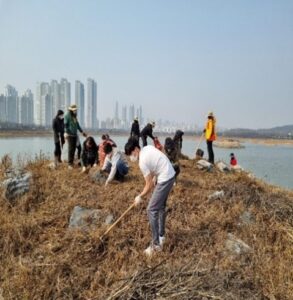 |
 |
Participating in Cleansing Activity at BFS Islands in Namdong Reservoir (March)/ BFS Visiting the Islands in June
©EAAFP Secretariat
Joining the Programme Team encouraged me to appreciate the importance of conserving the habitats of migratory waterbirds with my bare eyes through visiting the sites and participating in ongoing local dialogues in terms of habitat conservation for migratory waterbirds. For instance, I had a chance to join volunteer activities of cleansing the BFS islands in Namdong Reservoir in March, but at that time I was rather skeptical that BFS would visit those islands for their breeding. When I revisited the site in May, however, it was shocking to meet countless BFS sitting and relaxing peacefully through the scope and binoculars. While I had forgotten childhood memories interacting as I followed a fixed education system as a teenager, this experience allowed me to recall those good old times, naturally rediscovering my innocent feelings. Visiting and assisting other potential local sites such as Yeoncheon, Gochang, Hwaseong, and Seocheon wetland areas to support their global importance for biodiversity and migratory waterbirds was also impressive to comprehend how local stakeholders such as government officials, residents and NGOs are putting a lot of effort into conservation actions.
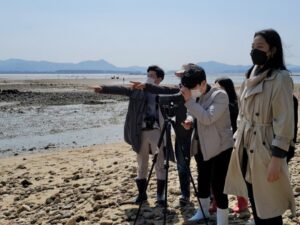
Visiting Daejukdo Tidal Flat, Gochang County, Jeollabuk-do, ©Gochang County
Majoring in Conflict Analysis & Resolution studies which focus on analyzing the cause of conflicts such as intertwined interests of the stakeholders from different levels, one of the greatest working experiences was assisting with the Hwaseong Wetlands visioning project in consultation with one of our EAAF Partners, Wildfowl & Wetlands Trust (WWT) from the UK. Throughout the 6-day business trip with the great WWT colleagues, I was deeply encouraged to learn the importance of active engagement and dialogue between residents, NGOs, and local government officials for the sustainable management of wetlands not only for migratory waterbirds but also for the community people who are using the wetlands. Though holding local stakeholder workshops for the Project demonstrated that there are ongoing conflicts due to different interests among the people who are engaged, I believed it was a valuable opportunity to analyze individuals’ stances and prioritized interests for wetland management. Most importantly, it was clear that they agreed to protect the wetlands for the sustainable development of the community itself and the wildlife. It was when I was able to truly acknowledge the statement that “migratory waterbirds connect the people”. I was able to hone my academic background knowledge about wetland’s potential as a significant blue carbon, a maritime resource that could be utilized as a carbon sink in regard to dealing with carbon neutralization for climate change mitigation.
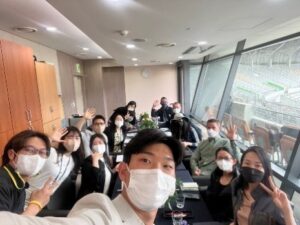 |
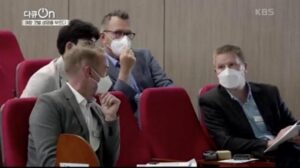 |
Assisting the Local Wetland Conservation Project in Hwaseong City with EAAF Partner, WWT
©EAAFP Secretariat, KBS
Another learning was the importance of youth engagement through Communication, Education, and Public Awareness (CEPA) activities, which is one of the EAAFP Secretariat’s main objectives. To fulfill sustainable development goals in terms of environmental conservation, youth engagement is especially essential to empower and bring momentum to the Secretariat’s ongoing practices. Coordinating a tour visit for the colleagues and staff of George Mason University Korea was one of the youth engagement programs I wanted to initiate. Through this opportunity, I was able to introduce the EAAFP Secretariat’s role in the conservation of migratory waterbirds and bring them to BFS islands, sharing the same feeling I firstly had with the participants. I wanted to encourage the students to understand the importance of conserving nature not only for the wildlife but also for ourselves. Based on this experience, I deeply hope that the Secretariat could facilitate more youth engagement by expanding the youth network starting from local approaches.
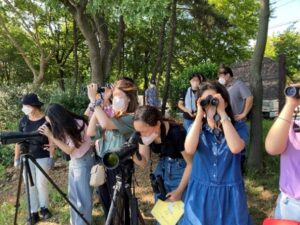 |
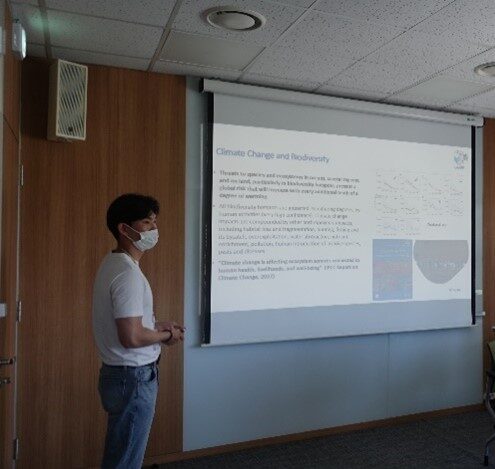 |
Successful Implementation of the Youth Engagement Activity for George Mason University Students
©EAAFP Secretariat
Fortunately, with full support from the EAAFP Secretariat, I was able to continue my internship virtually while I was staying in the US to complete my bachelor’s degree at George Mason University. Despite a number of challenges such as time difference and unavailability of in-person meetings, I was able to continuously support the Hwaseong Wetlands Visioning Project that has been implemented since the beginning of 2022. It was meaningful in that I could support translation work (English-Korean) not limited to the report documents, but also covering the simultaneous translation for WWT staff during the formal, online meeting with the officers from Hwaseong city. The internship did not only encourage me to assist in the ongoing project works at the Secretariat but also stimulated me to grow my overall interests in wetlands and biodiversity conservation. I was able to introduce such important global works to my colleagues while taking courses at my university, providing different insights into peacebuilding through environmental conservation. Based on my experiences at the EAAFP Secretariat, I have decided to improve my knowledge of sustainable transnational conflict resolution through transboundary environmental conservation by writing a research paper for my graduation in Spring 2023.
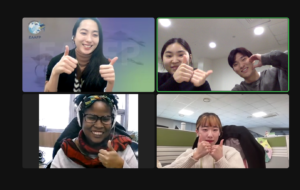
Last Meeting with Programme Team Colleagues/ ©EAAFP Secretariat
Above all, the most significant takeaway from this internship was the importance of teamwork, respecting each other with active communication, and encouraging attitudes. It would not have been possible without great support from my team and the energetic atmosphere that filled the entire Secretariat office. Working at the Secretariat taught me how to become a mature, professional individual who can contribute to our society. Huge thanks to the EAAFP Secretariat for providing this great opportunity, I will never forget the feeling I had here and keep this energy forever in my mind wherever I go and whatever I do.”


